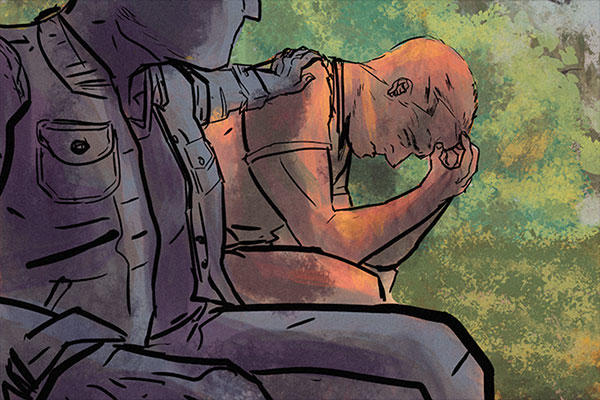Want to support veterans and service members?
Just be there.
We all can play a role in preventing suicide, but many people don't know what they can do to support the veteran or service member in their life who's going through a difficult time.
If you or someone you know is thinking about suicide, please call or text the National Suicide and Crisis Lifeline at 988.
During Suicide Prevention Month this September and year-round, help the U.S. Departments of Veterans Affairs (VA) and Defense let people know that preventing suicide starts with this simple act of support: Be There.
Helping someone feel included and supported can make a big difference during a challenging time. And it doesn't require a grand gesture or complicated task. A simple act of kindness can help someone feel less alone.
Small actions of support -- calling up an old friend, checking in on a neighbor, cooking someone dinner, or inviting a colleague on a walk -- are thoughtful ways to show you care. Similarly, encouraging veterans and service members to take time for themselves and to focus on their own health and wellness can have a big impact.
Then, start the conversation.
Being there for someone can be easy, but starting a conversation about your concerns for that person or approaching the subject of suicide can seem much more difficult. The most important thing is to show genuine, heartfelt support for someone going through a rough period in life. People may worry about what to say, be concerned about making matters worse, or think that special training is required to safely raise the subject (it's not).
When talking about a possible suicide risk or a life crisis, try to keep these best practices in mind:
- Remain calm.
- Listen more than you speak.
- Maintain eye contact.
- Act with confidence.
- Don't argue.
- Use open body language.
- Limit questions to casual information gathering.
- Use supportive and encouraging comments.
- Be as honest and upfront as possible.
Before you start a conversation, do some research to find out what suicide prevention and mental health resources are available. Veterans and their families can contact their local VA Medical Center using this Resource Locator to find counseling, treatment centers, and customized support for any life challenge.
Know when a crisis needs immediate action.
Everyone also should be aware of these signs of crisis, which require immediate attention from a medical or mental health professional:
- Thinking about hurting or killing oneself
- Looking for ways to kill oneself
- Talking about death, dying, or suicide
- Self-destructive behavior, such as drug abuse or the dangerous use of weapons
If you or someone you know is thinking about suicide, please call or text the National Suicide and Crisis Lifeline at 988.
Stay on Top of Your Military Benefits
Not sure what your veteran health care benefits are? Keep up with all the changes and details. Subscribe to Military.com. and get all the latest updates straight to your inbox.











